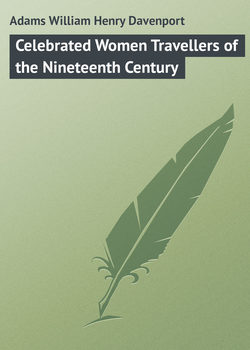Читать книгу Celebrated Women Travellers of the Nineteenth Century - Adams William Henry Davenport - Страница 5
MADAME HOMMAIRE DE HELL
ОглавлениеIII
Madame de Hell and her husband spent the winter of 1841 at Odessa. Thence, in the following year, they repaired to Moldavia – a country which was just beginning to revive from the barbarism and desolation in which the Turkish rule had so long condemned it to linger. Under the prudent and energetic management of the Aga Assaki, "The Moldavian Bee" and "The Gleaner" announced the resurrection of liberal thought and the patriotic sentiment in literary articles, nearly all signed by Moldavian names and written in the national language.
In the young Princess Morosi, the daughter of the Aga Assaki, afterwards married to Edgar Quinet, Madame de Hell learned to know and love a charming wit and a rare beautiful nature. She studied the French poets with assiduity, and her great ambition was to visit France, little thinking that she would one day become French by her marriage with the illustrious French writer.
In the Caucasian steppes our traveller's life had been singularly calm and serene; in Moldavia it was agitated and disturbed by mundane occupations, by official receptions, balls, concerts, dinners, the theatre, and the thousand and one responsibilities of social life. Worn and weary with the monotonous round of pretended pleasures, she frequently looked back with regret to the solitudes of the Caspian. Yet the event which delivered her from it was one that caused her a very keen anxiety. Her husband was attacked by one of the malarious fevers of the Danube, and in order to recover his health was compelled to throw up his engagement and return to France, after some years of almost constant travel and exploration.
On their arrival they were received with the welcome earned by their patience of investigation and strenuous pursuit of knowledge. While the young and already celebrated engineer was rewarded with the Cross of the Legion of Honour, his wife, who had shared his labours and his perils, and co-operated with him in the production of his fine work on the Steppes, was honoured with the special attention of M. Villemain, then Minister of State. Shortly after her return she gave to the world a volume of poetry, entitled "Reveries of a Traveller," a work strongly written, thoughtful, and emotional, which has never obtained the reputation it fully deserves.
In 1846 the two travellers departed on a second expedition to the East, which was cut short by the premature death of M. de Hell. His widow returned to Paris towards the close of 1848, so crushed beneath the calamity that had overthrown her household gods, that, as she has since acknowledged, she never slept without the hope that her sleep might know no waking in this world, but might prove the means of re-uniting her with her beloved husband. However, she was of too clear an intellect and too strong of heart not to recognize that the ties of duty bound her to this world; she had to bring up and educate her children, and to complete and publish the important works her husband had begun. While thus engaged, she contributed several articles on the East to the Presse and numerous other journals. In 1859 she published her own narrative of adventure and travel in the steppes of the Caucasus. Great political changes have occurred since Madame de Hell's visit to that region, which have profoundly affected the character of its people and their social polity; so that her account of it, as well as her account of the Crimea, must be read with the necessary allowances. These, however, will not detract from Madame de Hell's unquestioned merit as a close and exact observer, endowed with no ordinary faculty of polished and incisive expression, and a fine capacity for appreciating and describing the picturesque aspects of nature. She wields a skilful brush with force and freedom; her pictures are always accurate in composition and full of colour.
Her later years have shown no decay of her resolute and active spirit. She has accomplished a tour in Belgium, another in Italy, a visit to London, and several excursions into the South of France. In 1868 she proceeded to Martinique, where her eldest son had for some years been established. We believe she has published her West Indian experiences and impressions. But we have given up to Madame de Hell as much of our limited space as we can spare, and now take leave of her with the acknowledgment that among modern female travellers she deserves a high rank in virtue of her intelligence, her sympathies, and her keen sensibility to all that is beautiful and good.
